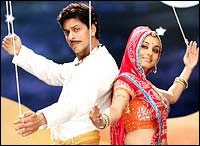 My God, the visuals!
My God, the visuals!
First things first, this is the best-looking Indian film in a very long time, and ranks up there with the finest ever. Amol Palekar has crafted a delectable fairytale that is incredibly well-shot. Ravi K Chandran's cinematography is spellbinding as he casts us into the fabulous sandscapes of Rajasthan with fluid harmony. Each frame of the film is picture-perfect, marinated in intoxicating colour.
Watching Paheli is quite an experience, and it's from the very opening shot of the film that its sheer, magical palette overwhelms us.
And we are immediately aware that we are witnessing a dream. Real life, as we ingloriously witness after reluctantly exiting the theatre, never looked this good. Rajasthan's colours are magnified to an awesome extent, every shot coordinated to the hilt. Girls in blood red cholis titter excitedly against vast golden sands, as an electric blue bird chirps past them. The contrasts are magnificent. The colours are vivid, unrelenting and addictively rich. This is life as we wistfully long for.
| |||||||||||
Rani Mukerji, too, never looked this good. In a rediff interview, the actress says she insists on movies shot by Chandran. Good move, Ms Mukerji.
The camera captures subtle nuances of Rani's everygirl face, and her expressive emoting talent is aided tremendously by the framing. Her Lachchi is an irresistible girl, just married to Kishenlal. She's a giggly little thing, mouthing handfuls of ber on the cart-ride back home, something that irks the newlywed groom, who feels they are above that sort of thing.
Note: Shah Rukh plays Kishenlal, and, in a while, another Shah Rukh plays Kishenlal 2. For the sake of sanity (both yours and mine), we'll just refer to both characters individually: Shah, the husband, and Rukh, the ghost.
Shah is the period Rajasthani equivalent of a chartered accountant. Born and bred to be nothing but a baniya, he is mesmerised by the concept of marriage. It's a whole new book to keep, you see. As his new bride throws him coy come-hither glances, he is still gaping at the khata, furiously trying to remember if he has totted up the figures right -- things aren't quite adding up. Won't you take off my ghoonghat? Yeah, okay, but did I remember to figure in pagris in the calculations?
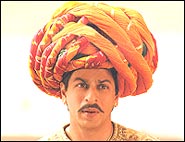 Thankfully, the language used in the turn-of-the-century piece isn't as colloquial. The Rajput twang is thick in every line, yet -- and this is no mean feat -- comes across as very natural.
Thankfully, the language used in the turn-of-the-century piece isn't as colloquial. The Rajput twang is thick in every line, yet -- and this is no mean feat -- comes across as very natural.
Rani is a fine actress, and both Shah and Rukh manage the inflections to a very believable degree. The lilt is quite endearing, and the words used are often out of Hindi, but their tone and context in the dialogue make sure we have no trouble comprehending what is said. The setting is also affluent, but avoids the pitfall of being overbearing.
Rukh is a sprite, a shapeshifting mischief-maker who wanders aimlessly around, amusing himself. Thoroughly smitten by Lachchi, he tries to woo her by entering the bodies of passing ravens and squirrels, even teasing her with a glimpse of his wet footprints. But Lachchi leaves, and the ghost is heartbroken. He circles a tree, disconsolate and disembodied, and talks to his friends, a pair of Rajasthani puppets, voiced perfectly by Naseeruddin and Ratna Pathak Shah.
The impassioned Rukh learns that Shah has left Lachchi alone the very morning after the wedding, and left on business for five years. The graveness of this injustice doesn't escape the besotted bhoot, and despite his puppet-friends' discouraging jeers, he decides to take Kishenlal's form, just so he can be closer to his lady-love. After all, the man won't be back for five whole years.
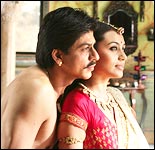 The chemistry between Rani and Rukh is great. It's warm and sensual, aggressive yet innocent. This is probably best credited to Rani, managing to be as credibly passionate as she was in Yuva.
The chemistry between Rani and Rukh is great. It's warm and sensual, aggressive yet innocent. This is probably best credited to Rani, managing to be as credibly passionate as she was in Yuva.
When she nuzzles playfully into the side of Rukh's face, the magical romance this film is meant to be throbs, hard and content. No one in the industry does a love story quite as well as Rukh, and here too he is perfect, drawing Rani in with a smouldering combination of intensity and restraint. Plus, a snap of his fingers can do it all, and he shuffles rose petals in mid-air with playful, irresistible ease.
The music in the film is great, sure, but there's too much of it. The first half of the film is laden with songs, and this slows the already languorous pace of the film to a trickle. Palekar's fairytale is obviously a film enjoying itself, the screenplay concentrating on pleasure rather than tautness. Still, the songs hamper the narrative, and the music, while perfectly acceptable by itself, just isn't compelling enough to keep you riveted to the screen. And it doesn't help that the best song in the film plays during the closing credits. The lazy song moments, however, are made tolerable by the fact that the film is more than easy on the eye.
The plot is simple as can be: Shah misses his wife, while Rukh kisses her. While Shah tortures dear-dad letters that never make it, Rukh artfully fixes a camel race and valiantly leads the village to water, a staple of feel-good rural cinema, seen in everything from Lagaan to Swades. To be fair, Palekar has always loved this simplistic theme, shown best in his 1990 film, Thodasa Romaani Ho Jaaye. Even as Rukh is the toast of the town, Shah returns home. No one believes Shah, of course, but the gossip-loving panchayat wants 'justice', and they set off to see the king.
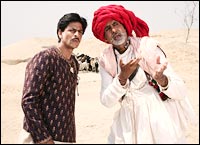 On their way, they are stopped by an eccentric old shepherd, who solves the day with superb, obvious efficiency. Amitabh Bachchan, kajal-eyed and wonderfully mad, is startlingly fantastic in this cameo. His wild shepherd is a gripping character, played with vintage accuracy reminiscent of his glory days. Perhaps these well-directed special appearances (remember the terrific dance in Veer-Zaara?) are just what the grizzled actor needs.
On their way, they are stopped by an eccentric old shepherd, who solves the day with superb, obvious efficiency. Amitabh Bachchan, kajal-eyed and wonderfully mad, is startlingly fantastic in this cameo. His wild shepherd is a gripping character, played with vintage accuracy reminiscent of his glory days. Perhaps these well-directed special appearances (remember the terrific dance in Veer-Zaara?) are just what the grizzled actor needs.
Of actors, Paheli is very appropriately fraught. Anupam Kher plays a fine, befuddled, Vitalstatistix-ian father; Juhi Chawla firmly enters Bollywood sis-in-law mode a la Renuka Shahane; Rajpal Yadav is great, as ever, as an incoherent messenger; and Dilip Prabhavalkar is just great as the oft-stoned Kanwarlal.
It is so easy to mess a film like this up, but Amol Palekar does remarkably well with Paheli. It's a leisurely told and naïve dream, and could simply descend into caricature at any point, but never crosses that line. It's a charming, warm romance capable of gifting the most sceptical of us a big, beaming smile. Children will love it, and the affection involved in the film's creation is infectiously visible to the audience. And the twist at the end raises astonishingly dark questions about fairytale metaphors, and sends you home thinking. Smiling, but thinking.
Yes, it's a slow film, but that's a small price to pay.
Shah Rukh has given a top-notch performance, justifying his supremacy in the film world. Despite what you may think of the mooch, odds are you'll come out of the film loving his opulent, dashing look.
Rani is undeniably one of the best actresses we have out there, and this is another perfectly played part.
The Badshah has finally produced a great film, and this won't be the last of them. It might not be a huge commercial hit, in fact, I doubt it will, but I'm going to revisit Paheli in theatres as often as I can afford.
As for Amol Palekar: He's brought Amar Chitra Katha marvellously alive, and for that I remain eternally grateful.




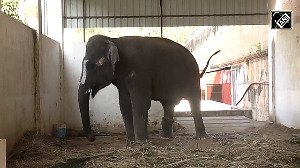

 © 2025
© 2025